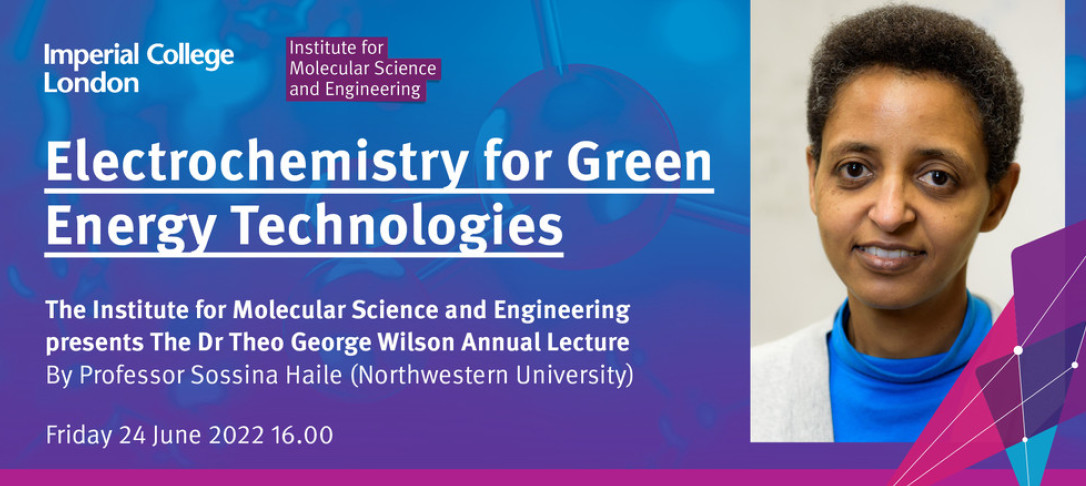
When and Where
The lecture will be held in City and Guilds Building Lecture Theatre 200, Imperial College London, South Kensington Campus on Friday 24 June 16.00-17.30. The lecture will also be accessible online.
More Information
The Institute for Molecular Science and Engineering’s invites you to attend their fourth Dr Theo George Wilson Annual Lecture :
Electrochemistry for Green Energy Technologies By Professor Sossina Haile (Northwestern University).
Our Dr Theo George Wilson Lecture is the flagship event in our calendar of activities, with the aim of drawing together a diverse audience from across Imperial’s student and staff body as well as from our community of friends and stakeholders. Our objective with the Dr Theo George Wilson Lecture is to inspire and engage the IMSE community by increasing its awareness of wider challenges and activities.For those who can attend in person there will be a drinks reception after the lecture in the City and Guilds foyer just outside of the lecture theatre where you will be able to network with our speaker and other guests.
This lecture is open to all.
Abstract
Over the past decade, the costs of solar and wind electricity have plummeted, declining by about 90%. The challenge modern society thus faces is not in creating green electricity technologies, but in storing the electricity for use when the sun isn’t shining or the wind isn’t blowing. Electrolysis of water, or using electricity to split the H2O molecule into hydrogen and oxygen, has garnered renewed interest due to the suitability of hydrogen for long term energy storage. Subsequent use of the hydrogen in fuel cells generates electricity without carbon emissions. Here we describe recent advances in electrochemical cells, based on proton conducting ceramic electrolytes, that can operate reversibly to both generate hydrogen from electricity and generate electricity from hydrogen, effectively functioning like rechargeable batteries. Beyond local interconversion between hydrogen and electricity, the use of hydrogen in automotive and other applications has been hindered by the lack of a hydrogen delivery infrastructure. One solution that is gaining momentum is the use of ammonia as carbon-free, easily liquified carrier of hydrogen. Success in this approach relies on local conversion of the ammonia into nitrogen and ultra-high purity hydrogen that can be supplied to fuel cells. We describe recent progress in the use of the superprotonic conductor CsH2PO4 as the electrolyte in ammonia electrochemical conversion. The overview of these technologies will focus on the fundamental materials limitations and the step undertaken to overcome them and achieve devices with compelling performance metrics.
Biography
Sossina M. Haile is the Walter P. Murphy Professor of Materials Science and Engineering at Northwestern University, a position she assumed in 2015 after serving 18 years on the faculty at the California Institute of Technology. She earned her Ph.D. in Materials Science and Engineering from the Massachusetts Institute of Technology in 1992 and spent two years, 1991-1993, at the Max Planck Institute for Solid State Research in Stuttgart, Germany, first as a Fulbright Fellow then as a Humboldt Fellow. Haile’s research broadly encompasses materials, especially oxides, for sustainable electrochemical energy technologies. Her work in fuel cell science and technology has pushed the field to new insights and record performance metrics. In parallel, she has created new avenues for harnessing sunlight to meet rising energy demands. Amongst her many awards, in 2008 Haile received an American Competitiveness and Innovation Fellowship from the U.S. National Science Foundation in recognition of “her timely and transformative research in the energy field and her dedication to inclusive mentoring, education and outreach across many levels.” In 2010 she was the recipient of the Chemical Pioneer Award (American Institute of Chemists), in 2012 the International Ceramics Prize (World Academy of Ceramics), and in 2020 the Turnbull Lectureship (Materials Research Society). She is a fellow of the Materials Research Society, the American Ceramics Society, the African Academy of Sciences, and the Ethiopian Academy of Sciences, and serves on the editorial boards of Annual Review of Materials Research, MRS Energy and Sustainability, and Joule. Her professional service includes past membership on the board of the Materials Research Society and current membership on the board of Ethiopia Education Initiatives.
About The Institute for Molecular Science and Engineering
The Institute for Molecular Science and Engineering (IMSE) is one of Imperial College London’s Global Institutes, drawing on the strength of its four faculties to address some of the grand challenges facing the world today. The Institute’s activities are focused on tackling problems where molecular innovation plays an important role.
If you have any questions about accessibility requirements please email events.imse@imperial.ac.uk


